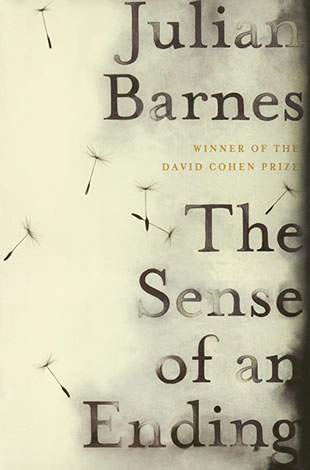 Reading the Longlist
Reading the Longlist
Remorse Versus
Fecklessness: One
Novel, Two Readings
The Sense of an Ending
by Julian Barnes
Review by Benjamin Craig
with Cecily Peterson
My wife and I read Julian Barnes’ The Sense of an Ending, not together exactly, but in succession. I picked up the book motivated, in part, by her dislike of it. The book had been nominated for the Booker Prize and I’d always appreciated the subtlety and simplicity of Barnes’ prose. When I asked her what she didn’t like about it, her response was: “Meh.”
It turned out to be about what I expected. Short, meditative, emotionally complex. It also turned out to be something I hadn’t really expected—tense. The novel’s plot begins with a letter that the narrator, Tony, receives from a lawyer—and grows more complicated when we learn about a letter that Tony sent long ago. Sure, plot that turns on letters from the past and the memories invoked can turn dry, stodgy. But the intensity of Tony’s emotional response and the memory excavation that follows is affecting. Tony’s clear understanding of himself and his past make his reflections more powerful than they might be if he were trying to unravel his feelings. His melancholy is both staid and visceral. Which is why, when my wife asked me to pick a quote from the book that would tell her what I thought the book was about, I offered this one:
“And no, it wasn’t shame I now felt, or guilt, but something rarer in my life and stronger than both: remorse. A feeling which is more complicated, curdled, and primeval. Whose chief characteristic is that nothing can be done about it: too much time has passed, too much damage has been done, for amends to be made.”
She rightly pointed out that I had chosen a passage that said nothing about the novel’s plot, or characters, or the setting, or even many of the themes. I had chosen to concentrate on the bit that interested me—the way Tony, and Barnes, grapples with the resurrection of old passions and suffering. I like the intelligence that Tony brings to bear on understanding himself and his mistakes. I like his loneliness and his acceptance of that loneliness.
She was less impressed. She chose the following passage:
“I’m retired now. I have my flat with my possessions. I keep up with a few drinking pals, and have some women friends — platonic, of course. (And they are not part of the story either.)”
Her complaint: the narrator is boring, too self-aware, fixated on intellectual matters, concerned with sex with women but not concerned with actual women, feckless and unlikable. Well, yes, she’s right. I liked it. ΩBenjamin Craig is a managing editor at the magazine.


